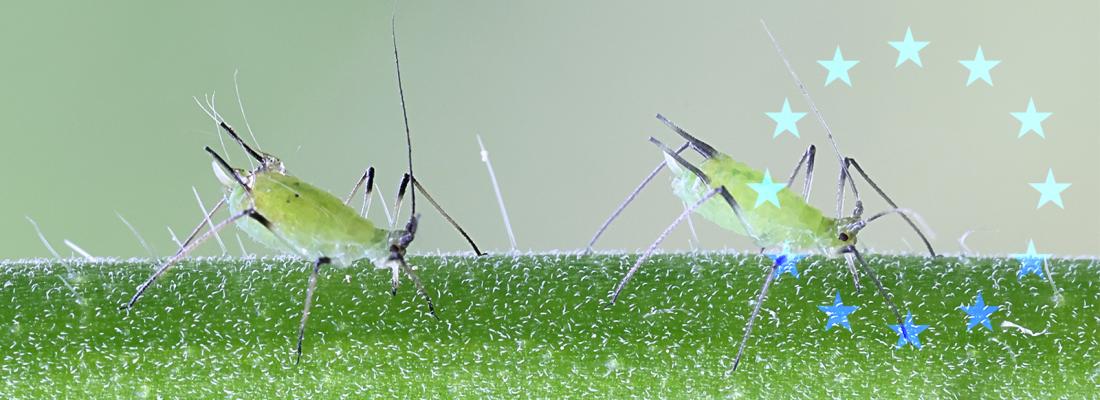Biodiversity Reading time 5 min
An ERC Grant to better understand plant-insect interactions
Published on 01 September 2022

How do species adapt to changes in the environment?
"A first process has to do with natural selection, which, over a long period of time, will select those specimens that are the best adapted to a new environment. A second process, phenotype plasticity, is an organism's response, on a much shorter timescale, to a change in the environment. An example of this is the arctic fox, whose fur is white in the winter and brown in the summer," explained Jean-Christophe Simon, INRAE research director at the Institute of Genetics, Environment and Plant Protection. "I am interested in a specific type of phenotype plasticity, polyphenism, which is an organism's ability to produce very different forms depending on environmental conditions." To explain further: "Bees, for example, form castes consisting of workers, queens and drones; certain crickets have winged specimens and others that have no wings. Behind each change is a single piece of genetic information (or genotype) that is able to produce different characteristics (or phenotypes) in response to environmental factors such as the temperature or food resources."
A fascinating field of research that Jean-Christophe Simon is studying in aphids, a major crop pest insect, by means of an original and ambitious project, ALTEREVO (Evolutionary and Molecular Determinants of a Nutritional Polyphenism), selected for a European Research Council Advanced Grant. His goal: to understand the mechanisms that govern the production of specialised forms to feed off distinct plants and how they came to evolve.

The European Research Council (ERC) is a funding programme targeting exploratory research and whose main selection criterion is scientific excellence. Advanced Grants are meant for researchers who have a track record of significant research achievements over the past 10 years.
ALTEREVO, a project with three focal areas
Through evolution, aphids have developed a large number of instances of polyphenism, including nutritional polyphenism. This involves an ability to produce different forms (or morphs) that feed on woody or herbaceous plants depending on the season. ALTEREVO is exploring three different facets of this nutritional polyphenism:
- The first involves the mechanisms that govern such changes in host plants and their environmental and molecular determinants.
- The second looks at aphid symbionts, i.e. the bacteria they host and that they cannot live without, so as to understand how those bacteria contribute, or at least respond, to the change in host plant.
- The goal of the third is to reconstitute the evolutionary stages of such polyphenism and determine which genetic material it arose from.
"I have two theories: the first assumes the acquisition of new genes; the second is based on using existing pathways and modifying their regulation mechanisms," explained Jean-Christophe Simon.
Jean-Christophe has proposed an original approach with ALTEREVO: one that connects polyphenism's evolutionary, molecular and environmental components and takes into account the involvement of symbionts.
A human and scientific adventure
In November 2022, a long-term (2022-2027) adventure will begin with significant financial support, i.e. EUR 2.5 million, making it possible to carry out a large-scale project with an unusual level of both human and material resources.
"In all, there will be three postdoc students, two doctoral students and a research assistant for the project, forming a team of men and women I will be leading. ALTEREVO will also involve other colleagues and partners I am used to working with. It will allow us to build momentum that will go far beyond the small ALTEREVO team," noted Jean-Christophe Simon.
The project will also provide him with an opportunity to bring his colleagues on board. "Through ALTEREVO, they will benefit from a stimulating scientific environment and will contribute to ambitious research without having to worry, at least for a time, about finding funding. This project will help widen the sphere of influence of both my team and my unit, and even beyond, I hope," enthusiastically concluded Jean-Christophe Simon.

Mini-CV
58 years old
- Education
1991: Doctoral thesis, Biologie et écologie des populations (Population biology and ecology) – Univ. Paris VI
1987: Master Biologie et écologie des populations – Univ. Paris VI - Career
Since 2007: Research director, Institute for Genetic, Environment and Plant Protection (IGEPP), INRAE Brittany-Normandy
1991: Research scientist, Organism and Population Biology for Plant Protection, INRAE Brittany-Normandy
1987: Scientific attaché, Zoology laboratory, INRAE Brittany-Normandy
2004-2011: Deputy-Director and then Director of the Organism and Population Biology for Plant Protection unit
Since 2014: Co-Head of the French Network on Environmental Genomics
Since 2012: Co-Head of the French Aphid Research Network.
